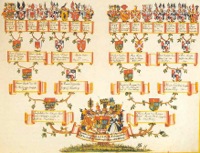Difference between revisions of "Genealogical"
(Created page with 'File:lighterstill.jpgright|frame ==Origin== Greek ''γενεᾱλογία'' tracing of descent. [http://nordan.daynal.org/wiki/inde...') |
m (Text replacement - "http://" to "https://") |
||
| (One intermediate revision by the same user not shown) | |||
| Line 2: | Line 2: | ||
==Origin== | ==Origin== | ||
| − | [[Greek]] ''γενεᾱλογία'' tracing of [[descent]]. [ | + | [[Greek]] ''γενεᾱλογία'' tracing of [[descent]]. [https://nordan.daynal.org/wiki/index.php?title=English#ca._1100-1500_.09THE_MIDDLE_ENGLISH_PERIOD Middle English] ''genealogie'', from Anglo-French, from Late Latin ''genealogia'', from [[Greek]], from ''genea'' [[race]], [[family]] + -logia -logy; akin to [[Greek]] ''genos'' [[race]] |
| − | *[ | + | *[https://en.wikipedia.org/wiki/14th_century 14th Century] |
==Definitions== | ==Definitions== | ||
*1: an account of the [[descent]] of a [[person]], [[family]], or [[group]] from an [[ancestor]] or from older forms | *1: an account of the [[descent]] of a [[person]], [[family]], or [[group]] from an [[ancestor]] or from older forms | ||
| Line 14: | Line 14: | ||
The pursuit of [[family]] [[history]] tends to be shaped by several [[motivations]], including the [[desire]] to carve out a place for one's family in the larger historical [[picture]], a sense of [[responsibility]] to preserve the [[past]] for [[future]] [[generations]], and a sense of self-[[satisfaction]] in accurate storytelling. | The pursuit of [[family]] [[history]] tends to be shaped by several [[motivations]], including the [[desire]] to carve out a place for one's family in the larger historical [[picture]], a sense of [[responsibility]] to preserve the [[past]] for [[future]] [[generations]], and a sense of self-[[satisfaction]] in accurate storytelling. | ||
| − | Some [[scholars]] differentiate between genealogy and [ | + | Some [[scholars]] differentiate between genealogy and [https://en.wikipedia.org/wiki/Family_history family history], limiting genealogy to an account of [[kinship]], while using "family history" to denote the provision of additional details about lives and historical [[context]]. |
| − | Historically, in [[Western]] [[societies]] the [[focus]] of genealogy was on the [ | + | Historically, in [[Western]] [[societies]] the [[focus]] of genealogy was on the [https://en.wikipedia.org/wiki/Kinship_and_descent kinship and descent] of rulers and nobles, often arguing or demonstrating the legitimacy of claims to wealth and power. The term often overlapped with [https://en.wikipedia.org/wiki/Heraldry heraldry], in which the ancestry of royalty was reflected in their [https://en.wikipedia.org/wiki/Coats_of_arms coats of arms]. [[Modern]] [[scholars]] consider many claimed noble ancestries to be fabrications, such as the [https://en.wikipedia.org/wiki/Anglo-Saxons Anglo-Saxon] chronicles that traced the [[ancestry]] of several [[English]] [[kings]] to the god [https://en.wikipedia.org/wiki/Woden Woden].[https://en.wikipedia.org/wiki/Geneaology] |
[[Category: History]] | [[Category: History]] | ||
Latest revision as of 01:17, 13 December 2020
Origin
Greek γενεᾱλογία tracing of descent. Middle English genealogie, from Anglo-French, from Late Latin genealogia, from Greek, from genea race, family + -logia -logy; akin to Greek genos race
Definitions
- 1: an account of the descent of a person, family, or group from an ancestor or from older forms
- 2: regular descent of a person, family, or group of organisms from a progenitor or older form : pedigree
- 3: the study of family pedigrees
- 4: an account of the origin and historical development of something
Description
Genealogy (from Greek: γενεά, genea, "generation"; and λόγος, logos, "knowledge") is the study of families and the tracing of their lineages and history. Genealogists use oral traditions, historical records, genetic analysis, and other records to obtain information about a family and to demonstrate kinship and pedigrees of its members. The results are often displayed in charts or written as narratives.
The pursuit of family history tends to be shaped by several motivations, including the desire to carve out a place for one's family in the larger historical picture, a sense of responsibility to preserve the past for future generations, and a sense of self-satisfaction in accurate storytelling.
Some scholars differentiate between genealogy and family history, limiting genealogy to an account of kinship, while using "family history" to denote the provision of additional details about lives and historical context.
Historically, in Western societies the focus of genealogy was on the kinship and descent of rulers and nobles, often arguing or demonstrating the legitimacy of claims to wealth and power. The term often overlapped with heraldry, in which the ancestry of royalty was reflected in their coats of arms. Modern scholars consider many claimed noble ancestries to be fabrications, such as the Anglo-Saxon chronicles that traced the ancestry of several English kings to the god Woden.[1]
